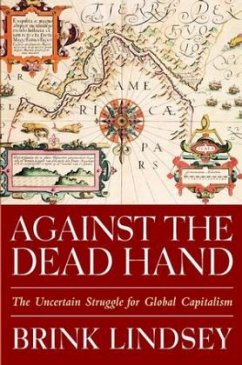"Against the Dead Hand" erläutert das Phänomen der Globalisierung in einem breiter gefassten historischen Kontext. Es macht deutlich, dass die Globalisierung keine seltsame Kraft ist, die erst durch den Microchip und das Internet entfesselt wurde, sondern eine logische Konsequenz des weltweiten Scheiterns staatlich gelenkter Wirtschaftsentwicklung ist. Autor Brink Lindsey stellt fest, dass die internationale wirtschaftliche Integration mit einer beängstigenden Reihe von Hindernissen konfrontiert war und bleiben wird - nämlich mit der noch immer gewaltigen Trägheit des kollektivistischen Status Quo. Auf lange Sicht jedoch zeichnet dieses Buch ein klares Bild vom aktuellen Stand der Globalisierung und ihrer Zukunftsaussichten. In der hier erzählten Geschichte vermischen sich historische Schilderung, originelle und nachdenklich stimmende Argumente mit aktueller Berichterstattung und Interviews. Hervorragend geschrieben und brillant argumentiert. Dieses Buch wird auch Ihre Einstel lung zur internationalen Wirtschaft verändern.
"For every copy of Jihad sold, I hope 10 copies are purchased and read of the new book Against the Dead Hand." (Chief Executive Magazine, December 2001)
"compelling...excellent". (The Wall Street Journal, April 4, 2002)
"GLOBALISATION is often described as an irresistible new force that, depending on your perspective, will either wreck or save the planet. Brink Lindsey provides an eloquent, much needed corrective by putting international integration into historical context.
Mr Lindsey points out that today's period of globalisation has a precursor in the free markets and economic integration of the mid-19th century. That early bout, however, was cruelly interrupted by what Mr Lindsey calls the industrial counter-revolution: an enthusiasm for collectivism, for national economic planning, and, in its most extreme cases, for communist economies. For much of the 20th century, the invisible hand of the market gave way, he writes, to the dead hand of the state.
That changed when large parts of the world emerged from communism and statism. But the process is far from finished. With his stories from the Russian steel mills of Magnitogorsk to backyard makers of 'boogis' (bare-boned home-made vehicles) in India, Mr Lindsey explains how the effects of state ownership, price controls, trade barriers and other leftovers from the statist era still grossly impede the global economy.
He regards the failings attributed to globalisation (the financial crises of the late 1990s, for instance) as the result of a collision between markets and statism. Yes, globalisation has been unstable. The cause is less market liberalisation as such than the fact that the liberalisation remains incomplete. At times Mr Lindsey's faith in the market may be extreme, but mostly this book is full of elegantly argued good sense." (The Economist, May 2, 2002)
"...Brink Lindsey provides an eloquent, much needed corrective by putting international integration into historical context...full of elegantly argued good sense..." (The Economist, 3 May 2002)
"...should be required reading for professional eceonomists..." (City to Cities, June 2002)
"compelling...excellent". (The Wall Street Journal, April 4, 2002)
"GLOBALISATION is often described as an irresistible new force that, depending on your perspective, will either wreck or save the planet. Brink Lindsey provides an eloquent, much needed corrective by putting international integration into historical context.
Mr Lindsey points out that today's period of globalisation has a precursor in the free markets and economic integration of the mid-19th century. That early bout, however, was cruelly interrupted by what Mr Lindsey calls the industrial counter-revolution: an enthusiasm for collectivism, for national economic planning, and, in its most extreme cases, for communist economies. For much of the 20th century, the invisible hand of the market gave way, he writes, to the dead hand of the state.
That changed when large parts of the world emerged from communism and statism. But the process is far from finished. With his stories from the Russian steel mills of Magnitogorsk to backyard makers of 'boogis' (bare-boned home-made vehicles) in India, Mr Lindsey explains how the effects of state ownership, price controls, trade barriers and other leftovers from the statist era still grossly impede the global economy.
He regards the failings attributed to globalisation (the financial crises of the late 1990s, for instance) as the result of a collision between markets and statism. Yes, globalisation has been unstable. The cause is less market liberalisation as such than the fact that the liberalisation remains incomplete. At times Mr Lindsey's faith in the market may be extreme, but mostly this book is full of elegantly argued good sense." (The Economist, May 2, 2002)
"...Brink Lindsey provides an eloquent, much needed corrective by putting international integration into historical context...full of elegantly argued good sense..." (The Economist, 3 May 2002)
"...should be required reading for professional eceonomists..." (City to Cities, June 2002)

